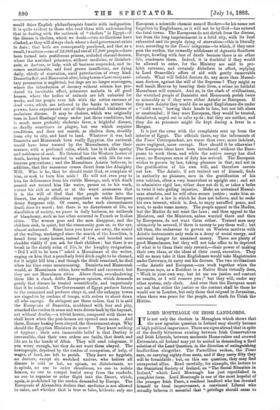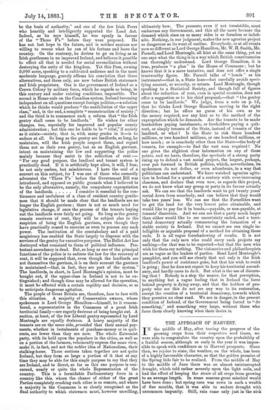LORD MONTEAGLE ON IRISH LANDLORDS.
IT is not only the election in Monaghan which shows that the new agrarian question in Ireland may shortly become of high political importance. There are signs abroad that in spite of the deadly bitterness existing between Irish Conservatives and Irish Liberals, between moderate Home-rulers and avowed Extremists, all Ireland may yet be united in demanding a final solution of the Land Question, in the direction of extinguishing landlordism altogether. The Parnellites reckon, the Times says, on carrying eighty-four seats, and if they carry fifty they will be formidable ; but, on this one question, they-may find unexpected allies. Read carefully, for example, the lecture to the Statistical Society of Ireland, on "The Social Situation in Ireland," which Lord Monteagle has just republished in pamphlet form. Lord Monteagle is one of the most hopeful of the younger Irish Peers,-a resident landlord who has devoted himself to local improvement, a convinced Liberal who actually believes it -essential that " privilege should ceaae to be the basis of authority," and one of the few Irish Peers who heartily and intelligently supported the Land Act. Indeed, as he says himself, he was openly in favour of the " Three F's" before they were proposed. He has not lost hope in the future, and is neither anxious nor willing to rescue what he can of his fortune and leave the country. On the contrary, he desires to go on living as an Irish gentleman in an improved Ireland, and believes it possible to effect all that is needed for social reconciliation without destroying the unity of the kingdom. Yet this Peer, owning 9,000 acres, speaking to a cultivated audience and in the most moderate language, gravely affirms his conviction that three alternatives, and three only, are now before British statesmen and Irish proprietors. One is the government of Ireland as a Crown Colony by military force, which he regards as being, in this century and under existing conditions, impossible. The second is Home-rule on the Canadian system, Ireland becoming independent on all questions except foreign politics,—a solution which he thinks would produce " the annihilation of the upper class," and, in the end, a complete " reconstruction of society ;" and the third is to commence such a reform that " the -Irish gentry shall cease to be landlords." He wishes for other changes, too, especially for improved and popular county administration ; but this one he holds to be " vital," if society as it exists—society, that is, with many grades in it—is to endure at all. So long as the gentry are landlords, so long, he maintains, will the Irish people suspect them, and regard them not as their own gentry, but as an English garrison, intent on maintaining the law and supporting the police mainly because they assist in the collection of rent :— "For any good purpose, the landlord and tenant system is practically dead. If it is artificially kept alive, it will, I fear, be not only useless, but mischievous. I have the zeal of a convert on this subject, for I was one of those who earnestly advocated the • Three F's ' before the Government Bill was introduced, and opposed on public grounds what I believed to be the only alternative, namely, the compulsory expropriation of the landlords I consider it essential to the con- tinuance and usefulness of a class of resident country gentle- men that it should be made clear that the landlords are no longer the English garrison ; there is not so much need for legislative change, if once the process of the tenants buying out the landlords were fairly set going. So long as the gentry remain receivers of rent, they will be subject also to the suspicion of being the English garrison, even though they have practically ceased to exercise or even to possess any such power. The institution of the constabulary and of a paid magistracy has enabled the State largely to dispense with the services of the gentry for executive purposes. The Ballot Act has destroyed what remained to them of political influence. Pro- testant ascendancy is dead. But, so long as one of the principal functions of the police is to enforce the law for the recovery of rent, it will be supposed that, even though the landlords are not themselves the garrison, it is on their account the garrison is maintained—that, in fact, they are part of the system." The landlords, in short, in Lord Monteagle's opinion, must be bought out, if the upper-class in Ireland is not to be ex- tinguished; and though time may be allowed for the operation, it must be effected with a certain rapidity and decision, so as to anticipate dangerous agitation.
The people of Great Britain are, therefore, face to face with this situation. A majority of Conservative owners, whose spokesman is Lord George Hamilton—himself, be it remem- bered, a representative in the Commons of a great Irish territorial family—are eagerly desirous of being bought out. A section, at least, of the few Liberal gentry represented by Lord Monteagle are equally desirous. A heavy majority of the tenants are on the same side, provided that their annual pay- ments, whether in instalments of purchase-money or in quit- rents, are lower than they are now. The whole Extremist party, with its hold upon the populace in the cities, as well as on a portion of the farmers, vehemently express the same view, make it, in fact, and not the nobler idea of Nationalism, their stalking-horse. Those sections taken together are not quite Ireland, but they form so large a portion of it that at any time they may be able for this single purpose to say that they are Ireland, and to direct, so far as this one purpose is con- cerned, nearly or quite the whole Representation of the country. This is a formidable Parliamentary force in a country like this, where the chance of either of the great Parties completely crushing each other is so remote, and where a majority in the Commons is so clearly recognised as the final authority to which statesmen must, however unwilling, ultimately bow. The pressure, even if not irresistible, must embarrass any Government, and this all the more because the demand which rises on so many sides is so formless or indefi- nite. Nothing, in our judgment, makes the new agrarian project so dangerous as its want of outline. Everybody, or at all events men so different as Lord George Hamilton, Mr. W. H. Smith, Mr. Parnell, and Lord Monteagle, all hint at the same thing, yet no one says what the thing is in a way which British constituencies can thoroughly understand. Lord George Hamilton, it is true, produces " a plan " in the House of Commons ; but he knows that it is a mere tentative, and does not offer a single trustworthy figure. Mr. Parnell talks of " bonds " as his instrument—that is, a State loan—but carefully avoids speci- fying amount, or security, or return. Lord Monteagle, though speaking to a Statistical Society, and though full of figures about the reduction of rent, even in special counties, does not- offer a suggestion as to his chief proposal,—that " the gentry cease to be landlords." We judge, from a note on p. 12,. that he thinks Lord George Hamilton moving in the right direction ; but he offers no guess of his own as to the money required, nor any hint as to the method of the expropriation which he demands. Are the tenants to be made freeholders paying instalments, or freeholders paying a quit- rent, or simply tenants of the State, instead of tenants of the landlord, or what Is the State to risk three hundred millions, or two hundred millions, or one hundred millions, or how much ; or is somebody other than the State—the body of tenants, for example—to find the vast sum required ? No one gives the slightest clear information on any of these points, and we have, therefore, the spectacle of a strong party rising up to defend a vast social project, the largest, perhaps, ever put forward in British politics, which, nevertheless, its spokesmen do not define, or even adumbrate, in a way that politicians can understand. We have watched agrarian agita- tion in Ireland for a quarter of a century with ever-increasing closeness, and declare that even now, as regards this project, we do not know what any group or party in its favour actually ask. We can see that the landlords want to get twenty rare' rental down from somebody, and can believe that they would take two years' less. We can see that the Parnellites want to get the land for the very lowest price obtainable, and would like to pay for. it in bonds,—payable, or non-payable, at tenants' discretion. And we can see that a party much larger than either would like to see uncertainty ended, and a terri- torial democracy actually commencing the formation of a stable society in Ireland. But we cannot see one single in- telligible or arguable proposal of a method for obtaining these ends. It is all vague foreshadowing of results. It is not only that the only men who could carry such projects say nothing—for that was to be expected—but that the men who wish for them say nothing. The visionaries and philanthropists are as vague as the leaders of parties. Read Lord Monteagle's pamphlet, and you will see clearly that not only is the Irish landlord's power of resistance gone, but that his wish to resist is going; that he does not expect to keep his territorial ascend- ancy, and hardly cares to do it. But what is the use of discern- ing that ? Nobody is a step the nearer, for that perception, to anything but a vague feeling that in Ireland the force- behind property is dying away, and that the holders of pro- perty who see this do not see any way to its restoration, except the creation of a territorial democracy, towards which they perceive no clear road. We are in danger, in the present condition of Ireland, of the Government being forced to "do something," and something very large, without those who force them clearly knowing what their desire is.



































 Previous page
Previous page